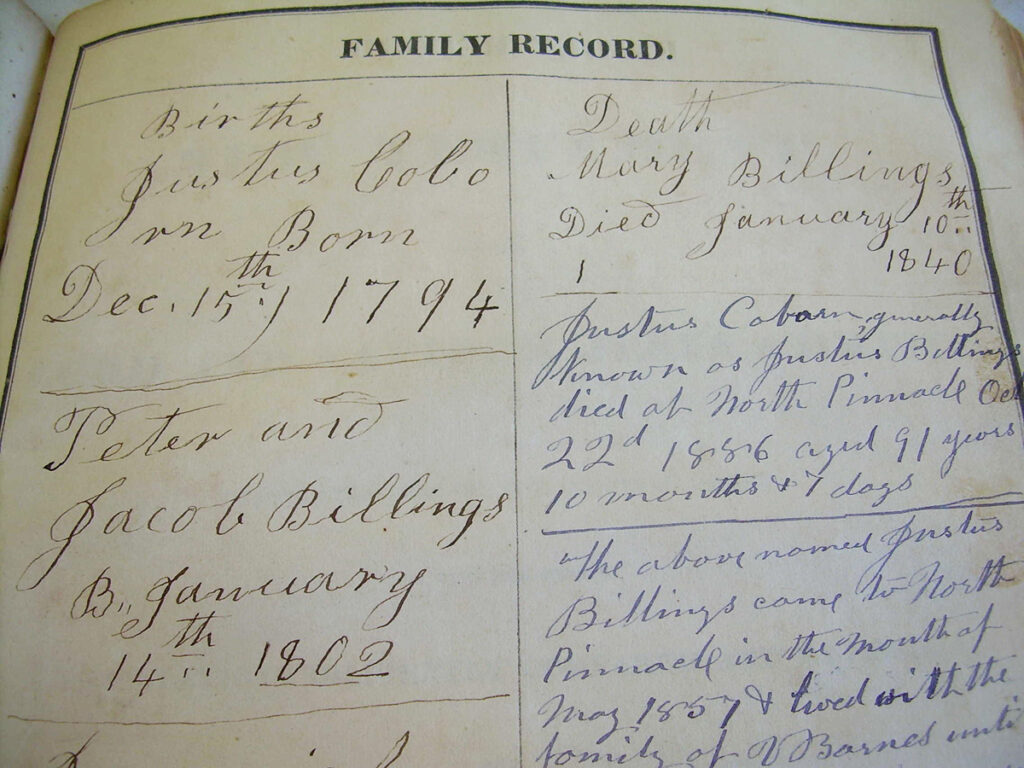Justus Makes His Mark

Un texte de Heather Darch
Paru dans le numéro Printemps/Spring 2021
Publié le : 12 mars 2021
Dernière mise à jour : 16 mars 2021
Justus Billings may at one time have been a slave, but this free Black man was part of the early community of St. Armand and actively participated in its development as a labourer and farmer and in its defence as a soldier.
Allegations of election fraud, presidential or otherwise, are not new. In the 1820 election of Lower Canada, a man named Justus Billings of Missisquoi County participated in a scheme to elect a Tory candidate to the Legislative Assembly. The outcry of fraud was not because a Black man voted, but because he was not a property owner.
For years, the story of Justus Billings began in 1857 when a farmer named Vinten Barnes Jr. from North Pinnacle, Quebec saved him from slavery. The account states that Justus was an escaped slave who was found wandering lost on the Pinnacle with only a Bible tucked under his arm. Barnes came to his rescue, gave him work and shelter and in return, Billings remained “a good and faithful servant.” The story is recorded in the Billings Bible, housed at the Brome County Museum, by a granddaughter of Mr. Barnes. The tale is remarkable but largely untrue.

A closer look into the life of Mr. Billings reveals that his first entry into the records of Lower Canada begins with the election of 1820. The Constitutional Act of 1791 did not specify that voters had to be white or male, just property owners, so this meant that women, Black and Indigenous people could vote in this time period; albeit racist attitudes prevented many from doing so. Voting took place at public polls with the practice of “treating” or serving food and alcoholic drinks being common. Voting could last for weeks as people had great distances to travel without a good road network.
The Bedford District Election of 1820 was an unusual one. Joseph Franchère (1785-1824) a Justice of the Peace and Commissioner of the Small Cases Court in Bedford County, had been elected as a member of parliament in April 1820, but the belated news that King George III had died in January, cancelled the results and a by-election was called. John Jones (1761-1842) a former representative for Bedford, went against Franchère to hold the seat.
Jones won the by-election, but Franchère‘s supporters cried foul and said the votes were rigged. Hearings into the election commenced in January 1821 and it is in the records of the inquiry that the name Justus Billings appears. He was a property-less tenant farmer and unqualified to vote, but he had come to the poll in St. Armand twice and on the second time a “refreshed” or drunk Billings, cast his vote for John Jones. He was one of 200 unqualified voters in the St. Armand poll including a Black woman named Hannah Caesar.
The election results were declared invalid and Jones was unseated in December 1821. Just before the second by-election of 1822, Billings became fully enfranchised through a land transaction conducted by notary Leon LaLanne – a supporter of Jones. Billings paid $50 for 80 acres in St. Armand on the understanding that within a year, James Ayer the landowner, also a Jones supporter, would reimburse Billings and reclaim his property. This was certainly a tactic to tip the vote for Jones, but Franchère managed to win the second by-election.
Interestingly, James Ayer was not able to finalize his reimbursement until 1825 and this may have allowed Billings to obtain other parcels of land as he voted in 1829 described as a “yeoman proprietor.” He also voted in 1834 in Frelighsburg and in the 1841 election for the first parliament of a united Province of Canada as a farmer from St. Armand.
Billings is also listed in the 1831 St. Armand East census and he is identified in four paymasters’ records of 1838-1839 as a member of the St. Armand East militia active in the Patriote Rebellion. He may also be the man in the store ledgers of Philip Luke and Jacob Burley known as “Billings the Post rider.”
On May 19th 1857, Barnes Jr. recorded in his day book that Justus Billings commenced working for him for “whatever I think he earns in clothing.” Billings is credited with building the stone wall and steps at the Barnes cemetery. In the 1881 census, an 86-year-old Justus Billings lives in the Barnes household. He died there on October 22nd 1886, in the 92nd year of his life. He was buried in a back corner of the Barnes cemetery where his solitary stone still stands.
The life of Justus Billings is far more interesting than the myth. He may at one time have been a slave. But this free Black man was part of the early community of St. Armand and actively participated in its development as a labourer and farmer and in its defence as a soldier. While not all of his votes were legal, his vote for the creation of a united province of Canada certainly counted.
Heather Darch
Sources:
Done with Slavery: The Black Fact in Montreal, 1760-1840 by Frank Mackey; The Bible of Justus Billings: Brome County Historical Society; Barnes Cemetery Records: Missisquoi Historical Society; Library and Archives Canada. Census of Canada, St Armand, Missisquoi County, Canada East (Quebec) 1881; Burial Record 1886 from Vital and Church Records (Drouin Collection); British Army and Canadian Militia Muster Rolls and Pay Lists, 1795-1850

